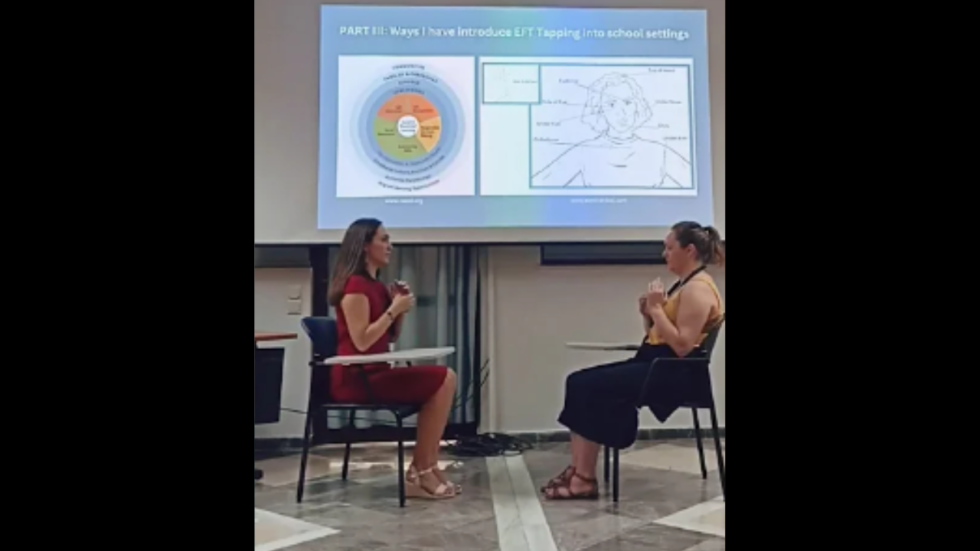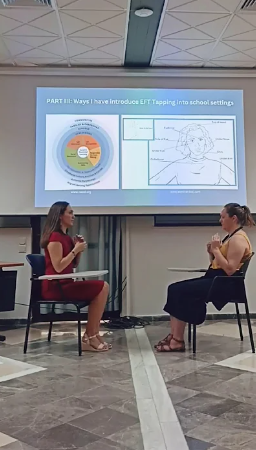
EFT in Schools at the European Network for Social Emotional Competences
WHAT’S UP: On September 6th 2024, Eleni led an in-person workshop in Crete at the 9th European Network for Social Competences (ENSEC) Conference. She started by introducing participants to the research on the effectiveness of EFT Tapping in schools for boosting mental health and Social Emotional Learning. She went on to explain and demonstrate how she has introduced EFT Tapping to school psychologists/counsellors, school leaders, teachers, and students from Preschool/Primary School through to Secondary School.
EFT in SCHOOLS
What was this conference about? The 9th ENSEC Conference was focused on the theme of Social Emotional Learning, in school settings, for lifetime achievement.
It took place in Chania, Crete, here in Greece, September 5th-7th. This year’s theme was Social Emotional Learning for Lifetime Achievement.
Topics covered in this conference include:
- SEL and Mental Health in Schools
- Resilience-Trauma
- Teacher training in SEL
- Well-being-Mindfulness
- SEL and assessment
- SEL and intercultural understanding
- SEL and educational policy development-consultation
- SEL for sustainable development
- SEL and inclusive practices
ENSEC conferences bring together researchers and practitioners to present on the latest studies and deliver workshops based on their research and/or their professional experiences.
EFT IN SCHOOLS WORKSHoP OUTLINE
Eleni delivered a 90-minute workshop called “EFT Tapping Boosting SEL and Mental Health in Schools” for the SEL (Social Emotional Learning) and Mental Health in Schools topic.
Participants:
- learned about the theoretical underpinnings and empirical evidence supporting clinical EFT Tapping’s efficacy in educational settings.
- got a first-hand experience of some of the ways Eleni has introduced EFT Tapping to students, educators, and school psychologists. Included will be a short EFT Tapping for stress demonstration with a volunteer from the group who would like to give a more personalized tapping exercise a go.
- considered age-appropriate and context-appropriate principles and adaptations for tapping with Primary School and Secondary School students, as well as with teachers and school psychologists in school environments.
SOME WAYS EFT IN SCHOOLS HELPS BOOST SEL and MEntal HEALTH
When our body is holding onto stress tension, our social and emotional competences are compromised. Our personal/professional relationships can suffer. Practicing EFT Tapping can help us transform stress-related tension, aches, or pains into increasing body awareness, emotional awareness, and social awareness.
EFT (Emotional Freedom Technique) Tapping is an evidence-based stress management set of techniques. When we are stuck in a chronic state of stress, our cortisol levels go up. When our cortisol levels go up (and stay up) our immune system is compromised, causing us to struggle to learn and make progress on achieving our goals.
A compromised immune system can cause students to get sick more often and miss more school days. To much stress can also cause kids to stay home due to stress-related stomach aches and headaches, developing gaps in their learning. This in turn makes achievements more difficult to attain later on down the line.
When there is a growing gap between the grades a student wants to achieve and where they are at due to missing so much school, it can affect a student’s mental health. It can also affect their interest in socialising with peers if feelings of shame start to emerge the more they fall behind. EFT can help boost their SEL and mental health as they start to close these gaps.
Another way that EFT can boost student mental health in a school environment by reducing Test Anxiety. There is lots of research evidencing the efficacy of EFT for improving mental health by reducing school-age students’ Test Anxiety levels.
RESEARCH PAPERS ON THE EFFECTIVENESS OF EFT IN GENERAL AND ON EFT IN SCHOOL ENVIRONMENTS
Aremu, A. O., & Taiwo, A. K. (2014). “Reducing Mathematics Anxiety Among Students with Pseudo-Dyscalculia in Ibadan through Numerical Cognition and Emotional Freedom Techniques: Moderating Effect of Mathematics Efficacy.” African Journal for the Psychological Studies of Social Issues, 17(1), 113–129.
Church D, Stapleton P, Vasudevan A, O’Keefe, T (2022) “Clinical EFT as an Evidence-based Practice for the Treatment of Psychological and Physiological Conditions: A Systematic Review” Frontiers Psychology, Sec. Psychology for Clinical Settings. https://doi.org/10.3389/fpsyg.2022.951451
Gaesser, A. H. (2019). Emotional freedom techniques (EFT): Stress and anxiety management for students and staff in school settings. In M. A. Bray & C. Maykel (Eds.), Promoting Mind-Body Health in Schools: Interventions for Mental Health Professionals. Washington, DC: American Psychological Association.
Gaesser, A. H., & Karan, O. C. (2017). “A Randomized Controlled Comparison of Emotional Freedom Technique and Cognitive-Behavioral Therapy to Reduce Adolescent Anxiety: A Pilot Study.” Journal of Alternative and Complementary Medicine, 23(2), 102-108. Randomized Controlled Clinical Trial. Doi:10.1089/acm.2015.0316
Gaesser, A. H. (2014). “Interventions to Reduce Anxiety for Gifted Children and Adolescents.” Doctoral Dissertations, 377. Randomized Controlled Clinical Trial. http://digitalcommons.uconn.edu/dissertations/377
Garbers S, Ancheta AJ, Gold MA, Maier M, Bruzzese JM (2023) “Sleeping Healthy, Living Healthy: Using Iterative, Participatory Processes to Develop and Adapt an Integrated Sleep Hygiene/Mind-Body Integrative Health Intervention for Urban Adolescents.” Health Promot Pract. Doi: 10.1177/15248399231184453. Epub ahead of print.
Jain, S., & Rubino, A. (2012). “The Effectiveness of Emotional Freedom Techniques (EFT) for Optimal Test Performance: A Randomized Controlled Trial.” Energy Psychology: Theory, Research, & Treatment, 4(2), 13-24. Randomized Controlled Clinical Trial. Doi:10.9769.EPJ. 2012.4.2.SJ
Kordi, M. (2023) “The Effectiveness of Emotional Release Technique (EFT) on the Expression Anxiety of Secondary School Students of Bagh-e Malek City”, Quarterly Journal of Approach to Philosophy in Schools and Organizations. Masters in Ed. Psychology dissertation, DOI: 10.22034/esbam.2024.435636.1043.
Lambert, M. T., Smith, S. E.; Moss, S., Kirshbaum, M. N. (2022) “Emotional Freedom Techniques (Tapping) to Improve Wellbeing and Reduce Anxiety in Primary Classrooms”, Australian Journal of Teacher Education, 7 (3). https://ro.ecu.edu.au/ajte/vol47/iss3/5/
Maier MC, Scharf JY, Gold MA, Ancheta AJ, Bruzzese JM, Garbers S (2023) “‘Our Mind Could Be Our Biggest Challenge’: A Qualitative Analysis of Urban Adolescents’ Sleep Experiences and Opportunities for Mind-Body Integrative Health Approaches to Improve Sleep”. PEC Innov. Doi: 10.1016/j.pecinn.2023.100130.
Sezgin, N., & Özcan, B. (2009). “The Effect of Progressive Muscular Relaxation and Emotional Freedom Techniques on Test Anxiety in High School Students: A Randomized Controlled Trial.” Energy Psychology: Theory, Research, and Treatment, 1(1), 23-30. Randomized Controlled Clinical Trial.
Sezgin, N., Ozcan, B., Church, D., (2009). “The Effect of Two Psychophysiological Techniques (Progressive Muscular Relaxation and Emotional Freedom Techniques) On Test Anxiety in High School Students: A Randomized Blind Controlled Study.” International Journal of Healing and Caring, 9(1). Randomized Controlled Clinical Trial.
Stapleton, P., Mackay, E., Chatwin, H., Murphy, D., Porter, B., Thibault, S. Pidgeon, A. (2017). “Effectiveness of a School-based Emotional Freedom Techniques Intervention for Promoting Student Wellbeing.” Adolescent Psychiatry, 7(2), 112-126. Randomized Controlled Clinical Trial.
Anastasia, et al (2013) “Effect of the Emotional Freedom Technique on perceived stress, quality of life, and cortisol salivary levels in tension-type headache sufferers: A randomized control trial”, Explore, Vol 9.
Bach, et al (2019), “Clinical EFT (Emotional Freedom Techniques) improves multiple physiological markers of health”, Journal of Evidence-Based Integrative Medicine, Vol 24
Church, et al (2012) “The Effect of Emotional Freedom Techniques on
Stress Biochemistry: A Randomized Controlled Trial”, The Journal of Nervous and Mental Disease, Vol 200
Stapleton, et al (2020) “Reexamining the Effect of Emotional Freedom
Techniques on Stress Biochemistry: A Randomized Controlled Trial”, Psychological Trauma: Theory, Research, Practice, and Policy
Stapleton, et al (2018) “An Initial Investigation of Neural Changes in Overweight Adults with Food Cravings after Emotional Freedom Techniques”, OBM Integrative and Complementary Medicine Journal, Vol 3.
Stapleton, et al (2022) “Neural changes after Emotional Freedom Techniques treatment for chronic pain sufferers”, Journal of Complementary Therapies in Clinical Practice, Vol 49
Wittfoth, et al (2022) “Bifocal emotion regulation through acupoint tapping in fear of flying”, Journal of NeuroImage: Clinical, Vol 34
Wittfoth, et al (2020) “Emotion regulation through bifocal processing of fear inducing and disgust inducing stimuli”, BMC Neuroscience Journal, Vol 21.
Maharaj, M. (2016) “Differential gene expression after Emotional Freedom Techniques (EFT) treatment: A novel pilot protocol for salivary mRNA assessment”, Energy Psychology, Vol 8.
Church, et al (2018) “Epigenetic effects of PTSD remediation in veterans using Clinical Emotional Freedom Techniques: A randomized controlled pilot study”, American Journal of Health Promotion, Vol 32.
MEET ELENI

Eleni Vardaki is a certified and accredited (Level 1, Level 2, Level 3) EFT Practitioner and Academic Coach who works with individuals, schools, and universities. In her private practice she offers therapeutic coaching services that support the well-being of kids and adults. She also delivers training on mental health topics such as how to apply EFT Tapping for Psychological First Aid in school settings.




